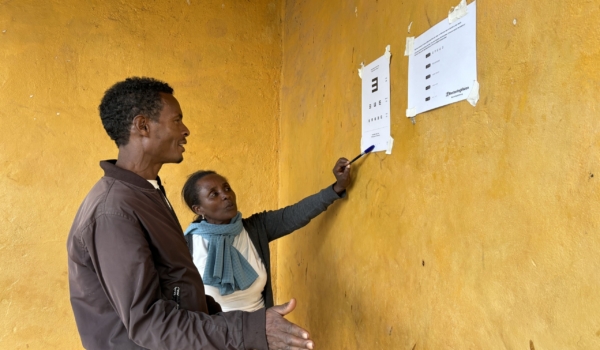Over the past three years, Last Mile Health has partnered with research institutions in Bangladesh, Brazil, Ethiopia, and Liberia to identify trends on establishing and sustaining high-performing national community health worker programs. Together, these countries offer valuable lessons that are documented in the newly-launched Exemplars in Global Health.
The following blog is part one of a four-part series highlighting the Exemplars in Global Health Initiative. The Liberia case study can be found here and was developed in collaboration with the University of Liberia, School of Public Health.
After enduring over a decade of civil war, Liberia’s short period of recovery was interrupted by the 2014-2015 Ebola outbreak, which killed almost 5,000 people and subsequently shocked an already strained health system. As Ebola hit, many Liberians stopped visiting health facilities and, as a result, antenatal care, safe delivery, and vaccinations sharply declined. For a country that had long struggled with low rates of access to healthcare — with the majority of medical providers living in urban areas and the majority of the population residing in rural ones — Liberia’s health system was struggling to meet the needs of its citizens.
But even with more than half of the population living in rural areas, Liberia managed to transform the health system in a remarkably short period of time. Through an exemplary health program, the national government — along with donors and partners — brought healthcare to 70 percent of the country’s previously unserved population, with the goal of reaching 90 percent by 2021.
In 2016, Liberia’s National Community Health Assistant Program was launched. With the initial goal of preventing future outbreaks, Liberia recruited and trained a cadre of more than 3,000 community and frontline health workers to provide care in 14 out of 15 of the country’s counties, serving an estimated 715,000 people (or 70 percent of a population that lives more than five kilometers from health facilities).
Due to bi-monthly home visits, regardless of a family’s health status, community health workers increased surveillance for infectious diseases, promoted education around maternal and neonatal care, delivered integrated case management to prevent under-five mortality (through the prevention and treatment of diarrhea, malaria, malnutrition and acute respiratory infection), and supported those living with HIV, tuberculosis, and non-tropical diseases.

Community health worker Aaron Garley discusses immunizations with a mother during a home visit in the community of Billibo in Konobo District of Grand Gedeh County, Liberia.
Since access to screening, education, and treatment increased, the results have been undeniable: treatment for pneumonia, malaria and diarrheal disease has increased by 40 percent; safe deliveries using skilled birth attendants has increased to 90 percent; and over 4,000 potential epidemic events have been identified while conducting one million home visits annually.
The success of Liberia’s National Community Health Assistant Program is what makes it an Exemplar in Global Health.
The deliberate strategy to incorporate community health workers into the country’s public health system and recognize them as key members of the community health teams paved the way for great success. Community health workers shared data they gathered in a centralized monitoring and evaluation system, ensuring metrics and trends were registered. Supervision and mentorship by clinically trained staff (nurses and physician assistants) enabled workers to be both supported and held accountable in their field work. Supervisors also created a vital referral link between patients with advanced needs and the formal healthcare system. Supply chains were strengthened so community health workers had access to tools and supplies they needed to provide basic care. A regular salary (instead of relying on community health workers to serve as volunteers or receive intermittent payments) was provided to ensure that financial compensation was commensurate with the hard work they were doing on a day-to-day basis. And finally, the Government of Liberia advanced its own vision of success to donors and partners, using transparent financial planning tools to generate support and accelerate investments for a program that costs less than five percent of the country’s total health budget.
Challenges remain, including uneven implementation that affects health worker performance and the quality of services provided. However, the urgency Liberia exhibited in rolling out its community health worker program, the commitment it made to uphold best practices, and the strategies implemented to ensure national reach, put the country on a successful path. The fact that it achieved success in expanding access to care in such a short amount of time, while being the third poorest country in the world, is a testament to resilience and a commitment to safeguard its population following devastation. This is also why Liberia is an Exemplar. Using its lessons, other countries may be able to adapt and implement programs more successfully.
About Exemplars in Global Health
Exemplars in Global Health is a program led by Gates Ventures and fueled by the research and insights of both in-country and global experts and partners, to identify the biggest global health success stories of our time. Exemplars in Global Health seeks to identify what public health interventions have delivered impact, how programs have been designed to circumvent challenges, and why specific interventions have led countries to become positive outliers of success. The program’s aim is to allow decision makers to explore proven strategies, policies and actionable recommendations that create similar pathways to scale their own success, in a faster, more effective manner.
To learn more about Liberia’s remarkable transformation, read the case study here.




